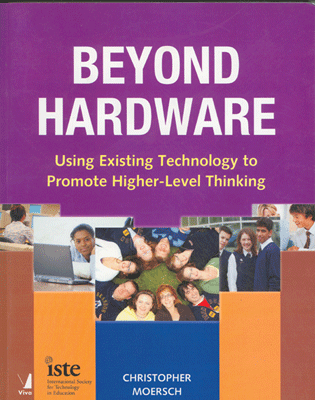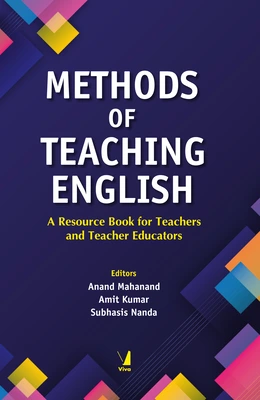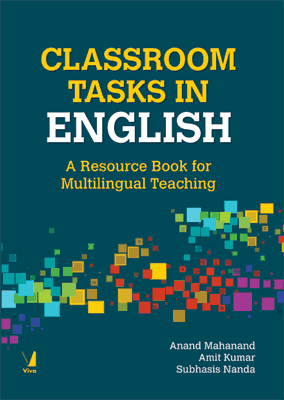
Beyond Hardware
Beyond Hardware
Using Existing Technology to Promote Higher-Level Thinking
₹265.50 ₹295.00 Save: ₹29.50 (10%)
Go to cartISBN: 9788130909066
Bind: Paperback
Year: 2009
Pages: 172
Size: 216 x 280 mm
Publisher: International Society for Technology in Education (Eurospan Group)
Published in India by: Viva Books
Exclusive Distributors: Viva Books
Sales Territory: India, Nepal, Pakistan, Bangladesh, Sri Lanka
Description:
"Get real!" asserts the author of this high-octane work. If we are ever to unleash the potential of instructional technology, we need to challenge prevailing attitudes, expectations, and beliefs. Schools needn’t replace existing curricula with dazzling projects requiring the latest hardware of software. In fact, schools already have everything needed to create effective technology-integrated curricula-teachers. The message is: Invest in them, and they will use existing technology to support the development of students’ higher-order thinking skills. This timely work-coming when education and technology have formed a clear bond-provides a logical blueprint for assessing the current situation, overcoming roadblocks, and applying leadership and systems thinking to instructional technology decision making. Includes the author's Levels of Technology Implementation (LoTI) Framework, an empirically validated assessment tool, and a detailed description of the New Technology Infrastructure - a future vision for the application of instructional technology.
Five Great Reasons for Every Teacher and Administrator to Have This Book
- Provides specific suggestions to guide teachers, administrators, and school systems in moving to a higher and more effective level of technology integration
- Maximizes teacher time and effort by offering a framework for developing and revising technology-integrated curricula that supports development of higher-order thinking skills
- Assesses traditional approaches to instructional technology professional development and suggests specific improvements
- Summarizes and reviews online teacher technology assessment tools
- Includes worksheets for assessing computer effectiveness
FEATURES:
- Contains specific ideas for integrating technology into classrooms.
- Contains materials and ideas for assessment of teaching and learning.
- Contains materials or ideas useful for higher education courses, inservice workshops, and other teacher training.
Target Audience:
School teachers and administrators, teacher educators, education researchers.
Contents:
Preface • Introduction • Section 1: Instructional Technology in the Schools • Chapter 1: Instructional Technology Confronted • Instructional Technology Acquisition • Academic Achievement • Thinking Skills • Systemic Change • Student-to-Computer Ratios • Students to Work • Internet Access • Institutional Technology Practices • Technology Standards • Computer Labs • Daily Operations • Professional Development for Technology • Teacher Comfort with Computers • Technology as Professional Development • Surveys and Assessments • Chapter 2: Assessing Instructional Technology • Levels of Technology Implementation • Stages of Instructional Practices • Chapter 3: Roadblocks to Effective Technology Use • Trickle Down Effect • Inefficient Staff Development • Lack of Strategic Planning • Ineffective Staff Development • Insufficient Computers • Lack of Technology Leadership • Societal Acceptance of Nonrestructuring • Section 2: The New Technology Infrastructure • Chapter 4: Applying Systems Thinking to Instructional Technology • Planning • Budgeting • Implementation • Evaluation • Creating a Common Vision for Institutional Technology • Consolidating Professional Development Opportunities • Chapter 5: Emphasizing High Levels of Computer Effectiveness • Higher-level Thinking Skills • High-octane Performance Assessment • Experiential Learning • Chapter 6: The Role of Leadership • Instituting Targeted Staff Interventions • Exercising Technology Leadership • Making Data-driven Decisions • Section 3: The Future of Instructional Technology • Chapter 7: Instructional Technology Revisited • Instructional Technology Acquisition • Instructional Technology Practices • Professional Development for Technology • Chapter 8: Future Prospects for Instructional Technology • Common Set of Standards • Existing Infrastructure • High-stakes Testing • New Breed of Educators • Inexpensive Hardware • Web-based Instructional Units • Pressure from Stakeholders
About the Author:
Dr. Christopher Moersch is co-founder and director of the National Business Education Alliance (NBEA) in Corvallis, Oregon - a nonprofit organization devoted to improving student academic achievement as well as the level of technology use in the classroom. He is a past school administrator and classroom teacher from southern California. As a researcher and national consultant, Dr. Moersch has lectured and written extensively on technology implementation, curriculum design, and performance assessment. Chris is married to Marsha Ann Pecaut Moersch, the other co-founder of the NBEA. Chris and Marsha are parents to three children: Jeremiah, Joel, and Joy.






